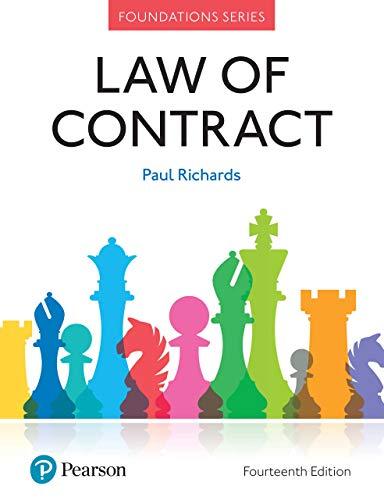Question
a. The buyer of a restaurant makes an offer in writing to seller to purchase seller's restaurant. But before the seller can accept, the restaurant
a. The buyer of a restaurant makes an offer in writing to seller to purchase seller's restaurant. But before the seller can accept, the restaurant burns down. Can the seller still accept?
- No; the offer lapsed when the restaurant burned down.
- No; the offer terminated when the restaurant burned down.
- Yes; the seller can still accept and sell the restaurant to buyer when it is rebuilt.
- Yes; because the offer for a real estate, when it is in writing, is valid and irrevocable for a reasonable period of time if no time period to accept the offer is communicated.
b. "I will sell you the Rolex on my wrist for $10,000 cash".
- This is a valid offer, but only if it is expressed in writing
- This is not a valid offer because it only invites the other party to negotiate
- This is a valid offer because it expresses a willingness to conclude the deal if the other party agrees to pay the required $10,000
- This is not a valid offer because it doesn't express the terms with sufficient clarity and definiteness
c. On August 1, you receive a message on your voicemail from the school you are looking to teach in. The voicemail is from the Accounting Department Chair, offering to hire you to teach a class for the semester. On August 5, after you received the Chair's message but before you have the opportunity to return the call to accept, the Chair notifies you that it hired someone else, and that it the offer made to you is being terminated.
Do you have any legal recourse against the school?
- Yes, because an offeree must always be provided a reasonable opportunity to respond to an offer
- Yes, because an answering message meets the formal requirements for an offer
- No, because no contract was formed
- No, because consideration was not specified
d. Of the following, all are true about quasi-contracts except:
- Quasi contracts are a fiction imposed by the courts "as if" the parties actually formed a contract
- Quasi-contracts are often actual contracts formed by the parties
- Quasi-contracts are usually not imposed if an actual contract exists
- Quasi-contracts are usually imposed to prevent unjust enrichment by one of the parties
e. When is a revocation effective?
- A revocation is effective upon dispatch by the offeror
- A revocation is effective upon receipt by the offeree
- A revocation is automatic after a reasonable amount of time
- A revocation is effective when the offeree agrees to the revocation
Step by Step Solution
There are 3 Steps involved in it
Step: 1

Get Instant Access to Expert-Tailored Solutions
See step-by-step solutions with expert insights and AI powered tools for academic success
Step: 2

Step: 3

Ace Your Homework with AI
Get the answers you need in no time with our AI-driven, step-by-step assistance
Get Started


